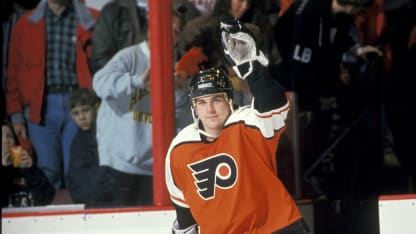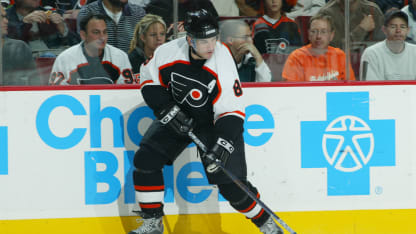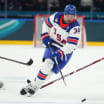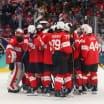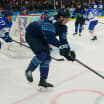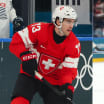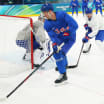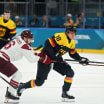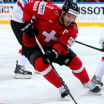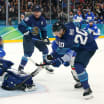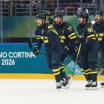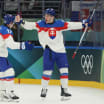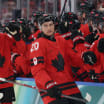You knew right away who No. 8 was. I didn't know Mark Recchi personally when he was a 21-year-old rookie with the Penguins and I was a 25-year-old veteran with the Flyers in 1989-90. But this little guy, not 5-feet-10, was very competitive and sneaky tough. He'd hit you. If you whacked him, he'd whack you back. At the end of the night, he had points. You noticed him on the ice and on the scoresheet.
I first got to know him when we played together at the worlds. We went for coffee before a game. Next thing I knew, he sprinted down the street -- in his suit. I didn't know if there was a burglary, a bank robbery, a fire. He just took off. Then I remembered, "Oh, yeah. That's right." I'd heard he'd go "high-stepping." That was his way of warming up.
I got to know him better after I was traded for him. I was kind of shocked, because he was a popular player in Pittsburgh. Mario Lemieux, Kevin Stevens, all these guys who'd played with him, would tell stories about him. They called him Knuckles, or Knucks for short. I knew I'd better produce, because I was replacing a really well-liked guy who had won the Stanley Cup the year before.
Mark was a complete player. For a small guy, he did not play on the perimeter. He played inside the dots. He could protect the puck in the corners and score in the slot and in front of the net. He played on the power play -- the point on the power play -- and killed penalties. He was just a very, very good player in every situation he was put in, and that's hard to do for that many years.
He hated losing. I mean, if you lost the game, he took it personal. I've been in closed-door, players-only meetings when he wasn't afraid to step up and say the right thing. It's not that he wasn't afraid to hurt people's feelings; it was that he wasn't afraid to tell the truth. I think that made him a great leader.
As much as he was an intense guy, he knew the sanctuary of the dressing room. You had to have fun too. We had a lot of fun in Philadelphia. Craig Berube would be the last to get a massage before we got dressed, so one of us would tape something to his stick. It became almost a ritual, every game something different. It started out small -- a bucket, a broom, a shovel -- and at the end it was a wheelbarrow. Mark and Chris Therien brought a real wheelbarrow in, put Craig's stick in it and taped it. Mark liked pranks.
